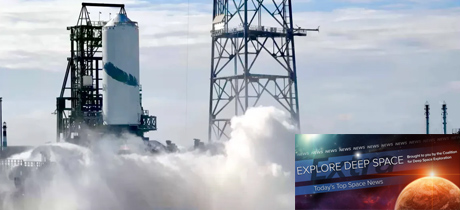Here is a list of news that were published in our Newsletter the week of September 23, 2024:
Human Space Exploration:
- SpaceX Crew-9 dropped 2 NASA astronauts from ISS mission, but they were prepared (video)
Coalition Member in the News – Boeing; - Watch Hurricane Helene approach Florida in this NASA video from the ISS
Coalition Member in the News – Boeing; - More UAE astronauts to undergo training at Johnson Space Centre in U.S.;
- NASA, SpaceX conduct pre-launch activities as Tropical Storm delays Crew-9 launch
Coalition Member in the News – Boeing; - Two-member SpaceX Crew-9 prepares for late week Dragon launch
Coalition Member in the News – Boeing; - ISRO plans first uncrewed Gaganyaan mission by year-end;
- NASA astronaut, 2 cosmonauts coming home from ISS today;
Space Science
- New type of Kevlar heading to ISS in October for space debris protection tests;
- A new rover design could crawl across the Moon for decades harvesting water;
- Where did Mars’ atmosphere go? Scientists say it may be ‘hiding in plain sight’;
- Will Comet A3 Tsuchinshan-ATLAS shine brighter than expected?
- China to launch near-Earth asteroid sample return mission in 2025;
- ‘We are close:’ SETI astrobiologist Nathalie Cabrol on the search for life;
- Military’s weather satellite program in flux as Space Force evaluates options;
- Scientists have found evidence of past extreme solar storms. Their return could be disastrous for our technology-based societies;
- What the 1st analysis of China’s Chang’e 6 lunar far side samples revealed;
- Europe’s Hera probe to launch October 7 to inspect asteroid NASA smacked in 2022;
- Approaching comet seen from the ISS;
- Moonquakes could ‘pose a possible hazard’ to Artemis Moon missions, study finds;
Opinion
- NASA’s cancellation of VIPER cedes leadership in lunar exploration
SpaceNews (9/23): In an op-ed, four veteran planetary scientists question NASA’s decision in July to cancel the Volatiles Investigating Polar Exploration Rover (VIPER) lunar mission to contain cost and address a schedule delay. Assembled and tested, VIPER is now the focus of a NASA-issued request for information (RFI) from U.S. industry and institutions interested in adopting VIPER to explore the Moon. The veteran scientists contend the decision will help enable China to become a world leader in lunar science, exploration and resource acquisition through missions accomplished, underway and planned.
Other News;
- Starfish Space wins $15M NASA award for a SSPICY mission to visit dead satellites;
- Blue Origin tests New Glenn upper stage;
- Leidos replaces Lockheed Martin on Artemis rover team
Coalition Member in the News – Lockheed Martin; - New image of China’s secret space plane shows delta-wing design;
- What will happen in the first space hostage crisis?
Coalition Member in the News – Boeing; - FAA chief defends latest delay for SpaceX rocket launch
Coalition Member in the News – Boeing; - Office of Space Commerce ready to turn on initial version of space traffic coordination system;
- House passes 2024 NASA authorization and ASCEND acts;
- U.S. eyes geostationary orbit for next-gen GPS
Coalition Member in the News – L3Harris Technologies; - KASA and NASA sign joint statement to enhance space cooperation;
- NASA creates space sustainability division to consolidate orbital debris activities;
- House to take up 2024 NASA authorization bill next week;
Major Space Related Activities for the Week
- Russia’s Soyuz MS-25 today returned to Earth with NASA astronaut Tracy Dyson and cosmonauts Oleg Kononenkio and Nikolai Chub. NASA’s Crew-9 mission is planned for launch no earlier than Thursday at 2:05 p.m. EDT from Cape Canaveral Air Force Station, Florida, all part of a crew exchange underway aboard the ISS.
- Meanwhile on Capitol Hill in Washington, the U.S. House will try again to gain passage of a budget continuing resolution (CR) to prevent a partial federal government shutdown with the October 1 start of the 2025 fiscal year. The CR resented by House leadership on Sunday would keep the federal government operating through December 20.
- The full House is also scheduled to take up the 2024 NASA Authorization Act, which was approved by the Science, Space, and Technology Committee in July. While it does not appropriate funding, the authorization measure offers broad support for NASA programs with a recommended $25.225 billion budget for 2025, a one percent increase over 2024. However, this is less than the $25.384 billion requested for NASA by President Biden earlier this year.
Subscribe to our Daily Newsletter:
Don’t miss the latest developments in space policy, science, and exploration with Deep Space Extra, delivered directly to your inbox from Monday to Friday.
|
|

